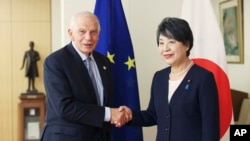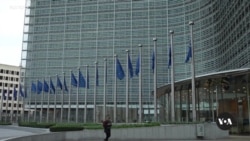The European Commission said Wednesday it recommended member states open membership talks with Ukraine once the country addresses several outstanding reform issues.
The EU granted Ukraine candidate status last year, four months after Russia launched its full-scale invasion of Ukraine.
EU leaders are expected to decide during a meeting in mid-December whether to accept the European Commission’s recommendation.
EU foreign policy chief Josep Borrell said Wednesday that Ukraine “belongs to our European family.”
“Today’s decision is a clear recognition of Ukraine’s relentless reform efforts and a strong political will despite the tragic circumstances,” Borrell said. “It acknowledges the strong resilience and resolve of the Ukrainian society.”
The commission said the membership talks should be launched once Ukraine resolves several remaining issues regarding fighting corruption, adopting a lobbying law that meets EU standards and strengthening national minority safeguards.
The EU’s executive arm also recommended opening membership talks with Ukraine’s neighbor, Moldova, and to extend candidate status to Georgia.
Ukrainian President Volodymyr Zelenskyy said Wednesday he welcomed what he called a “strong statement by G7 foreign ministers reiterating the unwavering support for Ukraine even amid other global developments.”
Japan holds the rotating presidency of the Group of Seven leading industrial nations, and G7 foreign ministers said in a joint statement Wednesday that their support for Ukraine in its battle against the Russian invasion “will never waver,” following meetings in Tokyo.
Ukraine’s E.U. candidacy status update comes as Kyiv reported a Russian missile struck a civilian ship under a Liberian flag as it entered the Black Sea port of Odesa, killing one and injuring four others.
One harbor pilot was killed, and another port worker injured; the other three injured were crew members of the ship, all of whom were citizens of the Philippines according to the Ukrainian military.
Military action in the Black Sea has increased by both Russia and Ukraine, after a deal allowing safe passage of civilian vessels, orchestrated by the U.N., fell through in July. The deal was created in effort to ensure Ukraine would be able to export grain.
Following the end of the U.N. deal, Moscow has warned that any ship traveling to Ukrainian ports could be viewed as targets.
Despite Ukraine’s efforts to set up a humanitarian corridor that follows a route avoiding international waters, Russia has continued to attack Ukrainian ports.
Some information for this story came from The Associated Press, Reuters and Agence France-Presse.







